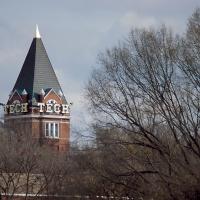It is one of the most abundant minerals on Earth. Silica is found in beach sand, playground sand, and desert sand. It is in gravel, clay, and granite. It is in the concrete and glass structures of buildings…
Sofía Hernández-Torres spent her summer working to optimize a testing device that will be used to measure muscle strength in mice that have an animal model of muscular dystrophy. The testing will help a research team…
Brianna Jones, a student in the Project ENGAGES program at the Georgia Institute of Technology, was featured recently on Atlanta radio station WABE 90.1 FM, a National Public Radio affiliate.
Project ENGAGES…
Ten freshmen are blazing a new trail and making history at the Georgia Institute of Technology as the inaugural cohort of students in one of the nation’s first two ESTEEMED programs, supported by the National…
Conan Zhao is the winner of ScienceMatters Episode 3 quiz.
ScienceMatters Episode 3 features M.…
Congratulations to the interdisciplinary teams awarded seed grants by the Regenerative Engineering and Medicine (REM) research center. REM is a collaborative partnership building on the success of Emory University…
They may look a little like space capsules, but nuclear magnetic resonance spectrometers stay planted on the floor and use potent magnetism to explore opaque constellations of molecules.
Three Atlanta area…
With support from the National Science Foundation (NSF), scientists at Emory and Georgia Tech, Northwestern and the University of Chicago will use advanced “machine learning” techniques to decode the complex…
Three data science projects in the National Science Foundation’s Transdisciplinary Research in Principles of Data Science (TRIPODS) program have…
A team from the Georgia Institute of Technology has received an award for $3.7 million from the National Science Foundation to help cover the cost of a new high performance computing (HPC) resource for the upcoming…
Brian Horslen, a postdoctoral fellow in the lab of Lena Ting, professor in the Wallace H. Coulter Department of Biomedical Engineering (BME) at the Georgia Institute of Technology and Emory University, is the…
The National Institutes of Health has awarded a four-year, $3 million grant to a research team at Emory and Georgia Tech that will use new technologies to improve the effectiveness of blood transfusions in patients…
Getting cancer drugs to permeate tumors can be tough, especially in the brain, but researchers have been using ultrasound to massage the drugs into malignancies that have taken root there. A …
Sally Bethea briefly recalls the history of Atlanta's air quality policies and the role of BBISS Deputy Director, Michael Chang, in the process of developing the science that has led to such great…
Machine learning is used in almost every decision now. It can help find good lending candidates, job applicants, and targeted advertising. Local governments rely on machine learning systems to allocate scarce…
Episode 3 of ScienceMatters' Season 1 stars M.G. Finn. Listen to the podcast and read the transcript here!…
Costas Arvanitis, researcher in the Petit Institute for Bioengineering and Bioscience at the Georgia Institute of Technology and assistant professor in the Wallace H. Coulter Department of Biomedical Engineering at…
Editor's Note: This story by Victor Rogers was originally published on the…
A team of semiconductor researchers based in France has used a boron nitride separation layer to grow indium gallium nitride (InGaN) solar cells that were then lifted off their original sapphire substrate and placed…
Editor's Note: This story by Victor Rogers was originally published on the…
























